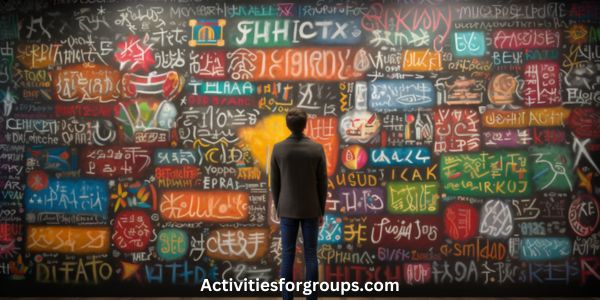Do you want to learn a language quickly? Are you wondering if group language learning is more effective than individual learning?
Our article is here to help you decide! We’ll talk about the advantages and disadvantages of both group and individual language learning, and how to choose the best option for you.

Let’s get started!
Advantages of Group Language Learning
You can benefit from group language learning as it offers numerous advantages. For starters, it provides peer support, which can be a great motivator for learners. Having someone to discuss progress and difficulties with can be extremely beneficial when studying a foreign language.
Furthermore, group learning can help participants gain a better understanding of the language by interacting with others. The team dynamics of a group setting can be very positive, allowing learners to encourage each other and help each other overcome language barriers.
In addition, group learning allows for a more social experience compared to individual learning. Being able to practice with other people in a relaxed and friendly atmosphere can help to make language learning a fun and enjoyable experience.
With group learning, learners can also benefit from the experience of the teacher. The teacher can provide valuable insight and guidance to all participants.
Finally, studying in a group setting can make learning more efficient. As learners have to communicate with each other, they’re forced to use the language they’re studying, which can help them to better understand the language and improve their language skills faster.
Group learning also allows for more opportunities to practice speaking the foreign language, which is often the most difficult part of language learning.
Disadvantages of Group Language Learning
However, there are also some drawbacks to group language learning. Although it is a great way to learn a language in a fun and social environment, it may not always be the most effective way to learn. One of the main disadvantages is that socializing can be a huge distraction.
It can be difficult to stay focused on the lesson when there are others around you talking and interacting. Additionally, when learning in a group, it can be difficult for the teacher to give each student the individual attention they need to succeed.
| Disadvantage | Description | Impact |
|---|---|---|
| Socializing | Talking and interacting with the other students rather than focusing on the lesson. | Can cause a lack of focus and reduce learning effectiveness. |
| Lack of Focus | Not being able to pay attention to the lesson due to outside distractions. | Can lead to lower grades and reduced comprehension. |
Advantages of Individual Language Learning

Gaining the full focus of a teacher’s attention can be one of the main advantages of individual language learning. When learning in a one-on-one setting, students can tailor their learning to their own needs and preferences.
They can focus on the language skills that they find most challenging and take their time when understanding new concepts. This is an advantage that group language learning doesn’t offer, as everyone in the group will have different language goals and needs.
Another advantage of individual language learning is that it can be more self-directed. Students have the opportunity to practice the language independently, without having to worry about other people’s opinions or progress.
This allows students to take their time and to learn at their own pace. This can be very beneficial for those who want to learn a language quickly, as they can use their time management skills to their advantage.
In addition, individual language learning offers more flexibility. Students can choose when and where to study, and can adjust their learning schedule according to their own needs and lifestyle. This can be especially helpful for those who’ve limited time or have other commitments.
Disadvantages of Individual Language Learning
One of the main disadvantages of individual language learning is the lack of social interaction. When studying a language by yourself, it can be difficult to get feedback or ask questions about your progress.
Additionally, when learning a language on your own, it can be easier to fall into a routine that doesn’t challenge you to reach language expectations. Without other people to motivate and encourage you, it can be hard to stay motivated and reach your learning goals.
Individual language learning can also make it difficult to become immersed in the culture of the language you’re learning.
Without a teacher or group to discuss the culture and customs associated with the language, it can be hard to understand the context of the language and why certain words and phrases are used. Additionally, without other people to practice with, it can be intimidating to try to speak the language and engage with native speakers.
Finally, without the guidance of a teacher or experienced learner, it can be hard to find materials or resources that are right for your level. This can lead to a lack of progress or feeling overwhelmed when trying to learn the language on your own.
How to Choose Between Group and Individual Language Learning?

You can decide whether group or individual language learning is best for you, so weigh the pros and cons of both.
Group language learning offers a number of motivational factors, such as the ability to work and learn together, the encouragement of peers, and the ability to make mistakes without fear of judgement.
However, individual language learning allows for a more personalized approach to learning, allowing you to work at your own pace and focus on topics or areas you’re particularly interested in. Additionally, it may suit those with a specific learning style that works best without the influence of others.
When making the decision between group and individual language learning, consider how you learn best and the amount of time you have available. If you’re motivated by the presence of others and have limited time for practice, group language learning may be the better option.
On the other hand, if you’re comfortable with self-paced learning and have the time to devote to it, individual language learning may be the best choice.
Ultimately, it’s important to choose a learning option that’s tailored to your needs and interests.
Frequently Asked Questions [FAQs]
What Is the Most Cost-Effective Way to Learn a Language?
Learning a language is a time and cost investment. Consider your learning style and budget to find the most cost-effective option. Group language learning can be great for motivation but may not be feasible if you’re on a tight budget.
How Long Does It Typically Take to Learn a Language Through Group or Individual Learning?
It depends on the learner’s language barriers and learning styles. Group learning can be a great way to learn a language quickly, but individual learning can take more time.
Are There Any Particular Techniques or Strategies That Are More Effective for Group or Individual Learning?
You might find that team dynamics and peer support can be effective techniques for group learning. Working with others can help you stay motivated and allow you to share experiences and strategies. However, individual learning might be more suitable if you prefer to work at your own pace.
Are There Any Cultural or Religious Considerations to Take Into Account When Choosing Between Group or Individual Language Learning?
You may want to consider cultural and religious factors when deciding between group or individual language learning. Intercultural communication can be a challenge, and language barriers may cause misunderstandings. Think about how a group setting may or may not help with communication.
Are There Any Specific Language Learning Resources That Can Be Used for Either Group or Individual Learning?
Yes! For both group and individual learning, there are many language learning resources, such as collaborative learning and online tutoring. Try them out to find the best fit for you!
Conclusion
When it comes to language learning, there’s no one-size-fits-all approach. It really depends on your individual learning style and goals.
Group language learning has its advantages, such as increased motivation and collaboration, but it can also be more distracting than learning on your own.
On the other hand, individual learning has its own benefits, such as allowing for more focused learning and time flexibility, but it can be more challenging to stay motivated.
Ultimately, it’s up to you to decide which learning method will work best for you.




Leave a Reply